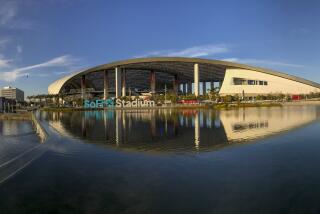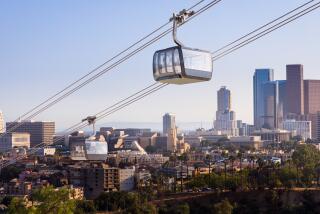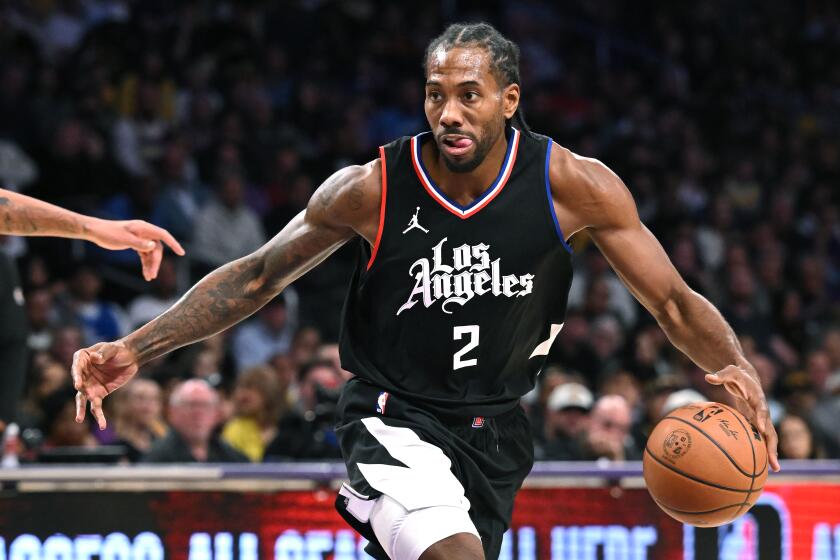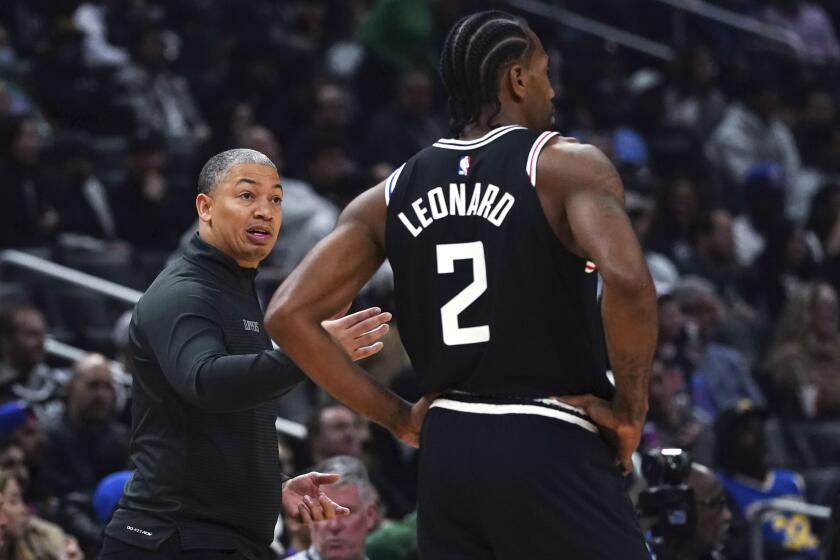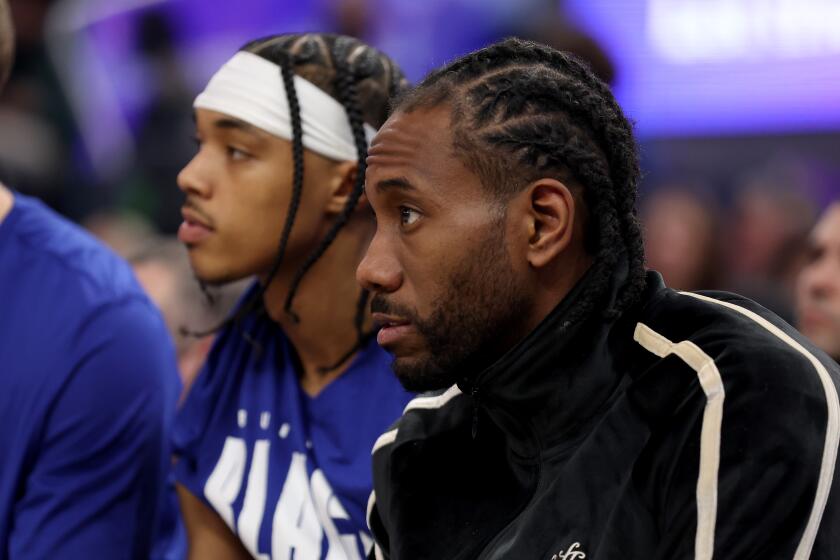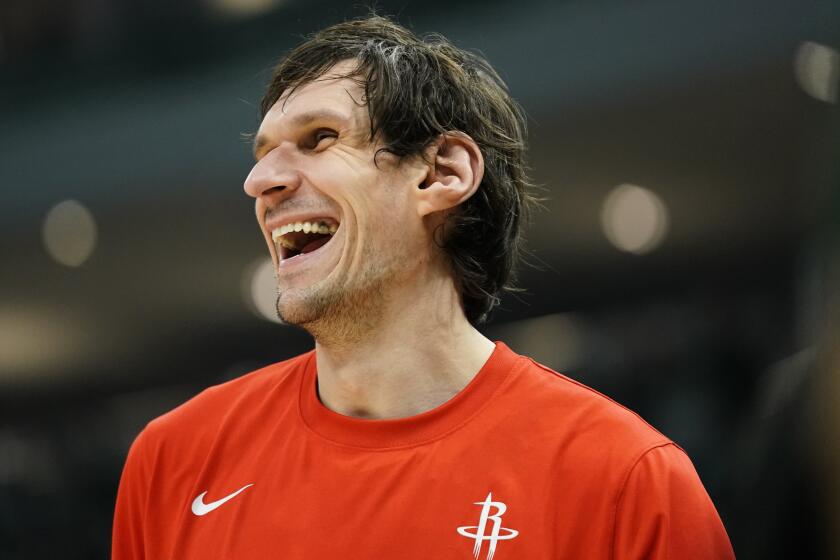Sealed court documents show Clippers plans for Inglewood arena had discreet beginning
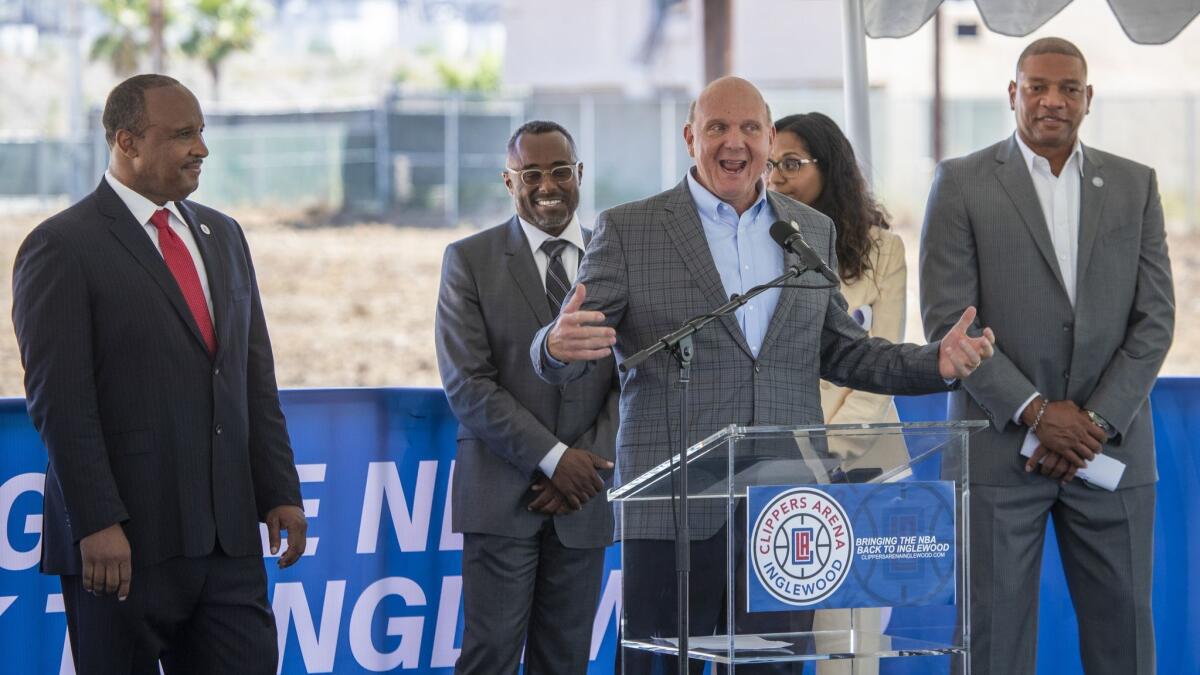
During the final minutes of a June 2017 council meeting, Mayor James T. Butts Jr. hailed progress being made across Inglewood: Crime had plummeted. The budget was more robust. And a $5-billion stadium for the NFL’s Rams and Chargers soon would anchor a sprawling mixed-use development at the heart of the city.
The transformation included another potential jewel: City lawmakers had just approved an exclusive negotiating agreement with a company controlled by the NBA’s Clippers for a proposed arena that would be privately financed by team owner Steve Ballmer.
But there was one major obstacle.
The Clippers wanted to use 22 acres of vacant, city-owned land across West Century Boulevard from the NFL stadium development — parcels that had been leased to the Madison Square Garden Co., the New York-based sports and entertainment giant that owns the nearby Forum, for overflow parking.
A year and a half later, the land is the subject of a bitter legal fight pitting Inglewood and Ballmer, the former Microsoft chief executive estimated by Forbes to be worth more than $42 billion, against MSG, whose holdings include the NBA’s New York Knicks, the NHL’s New York Rangers, esports teams and entertainment venues across the country, along with a stake in the Tribeca Film Festival.
At the center of the case — and the negotiations that could further Inglewood’s metamorphosis into a sports mecca — is Butts.
Though few details about the battle over the proposed arena have been made public, The Times obtained more than 1,100 pages of emails and other documents that shed light on the discreet effort to launch the project. The information had been filed under seal in Los Angeles County Superior Court last month but was available for public viewing online for about a week before being removed from the court’s docket.
Many of the documents were labeled “confidential” or “highly confidential.”
One appears to contradict what Butts characterized during a deposition last year as a less-than-encouraging early meeting he had with Clippers officials. Others show that discussions between Inglewood and the Clippers started much earlier than previously acknowledged, and that Clippers representatives worried MSG would learn about the arena plan before the company had agreed to surrender its parking lease.
MSG sued Butts and Inglewood last year, claiming the mayor tricked the company into terminating its lease so the city could make way for a technology park. The mayor repeatedly has denied the allegation. Murphy’s Bowl LLC, the Clippers-controlled company, countersued MSG in December.
Their dispute is about more than parking spaces.
MSG, once a staunch ally of Butts, doesn’t want a competing arena placed about a mile from the Forum after having invested $100 million to renovate the venue used for concerts, award shows and other events. The Clippers’ lease at Staples Center, which they share with the Lakers and Kings, expires in 2024.
The Clippers are not a fit to play at the Forum because of Ballmer’s insistence on his team controlling its home dates in a venue designed for basketball. The Forum’s renovation geared that facility toward music and entertainment options other than big-time professional sports.
According to the documents, Butts, Ballmer, Clippers’ minority owner Dennis Wong, developer Chris Meany and an associate, Gerard McCallum, met at the Ritz-Carlton in Marina del Rey on June 24, 2016 — about 10 months before Inglewood had said in court filings that it started negotiations with the team.
Wong recounted the meeting in brief notes typed two days afterward that were included in the filings. He said Butts wanted the Clippers in Inglewood and could make a permanent parking deal with MSG in the “next six months.” According to Wong’s account, Butts wanted the Clippers to pay Inglewood $1.5 million for the exclusive negotiating agreement. The mayor, Wong wrote, “gave confidence” the team could get the necessary entitlements.
During a deposition taken last August in connection with the lawsuit and excerpted in the court filings, Butts gave a much different account of the Ritz-Carlton meeting.
He said the Clippers “were looking to not renew their lease at Staples Center, that they were looking at five locations and that Inglewood was one and did we, you know, have any site available,” Butts testified. “And I told them no, we don’t.”
An attorney for MSG asked Butts how the Clippers representatives responded. “They were disappointed,” the mayor said, “but that’s the way it was.”
“Did they press you on it?” the attorney asked. “Did they ask about any particular sites?” Butts replied: “They did not press me.”
In response to questions from The Times about the meeting, Skip Miller, the attorney for Inglewood and Butts, declined to discuss specifics of the case because of a protective order. He issued a general statement instead:
“There’s absolutely no merit to Madison Square Garden’s lawsuit, which seeks to stifle competition and harm the City of Inglewood, its residents and the public,” Miller wrote in an email. “MSG is wrong on all counts; its claim of fraud is nothing more than sour grapes. Competition in the concert business, as the new arena proposes to bring to Inglewood, is a good thing; and MSG should have to compete like everybody else.”
Spokesmen for MSG and Meany declined to comment.
A Clippers representative issued a brief statement that also didn’t address The Times’ specific questions about what has become known as the Inglewood Basketball and Entertainment Center: “The LA Clippers are fully committed to completing a thorough environmental review of our Inglewood project. We look forward to opening this facility for our wonderful fans in 2024.”
Four days after the Ritz-Carlton meeting, Wong emailed Bill Hanway, an executive at the global architecture and engineering giant AECOM, to check if the land leased by MSG could fit an arena and ancillary development. Wong said the Clippers were “focused” on the property.
“Of course, we would hope to assemble the entire three blocks, but would be nice to know we can work with less,” Wong wrote.
The three blocks highlighted in a map attached to the email include a church, apartment buildings and private residences, though the exclusive negotiating agreement was later revised to exclude those structures.
“Please note that this is super confidential,” Wong wrote to Hanway, “and we would like to code name the site ‘eagle.’”
Two months later, on Aug. 29, 2016, Wong updated Ballmer on the Inglewood property and alternative sites under consideration. MSG’s parking lease with Inglewood, which included an option to buy the land for $6.9 million, remained a potential hurdle.
“It smells to me or maybe I am just paranoid, but there is a possibility that our interest has leaked so that MSG is creating a roadblock by not completing their parking arrangement which the Mayor said was basically done in June (or was it July),” Wong wrote in an email. “If that is the case, it will be more expensive.”
The documents show that while the Clippers said they were “focused” on Inglewood, their discussions included the since-demolished Sports Arena near USC, the Marlton Square shopping center in Baldwin Hills and the 157-acre former landfill in Carson where the Chargers and Oakland Raiders once hoped to build a stadium.
“Pass on Carson,” Ballmer emailed Wong a day later. “We would never go there. Staples would be better.”
A week later, Wong emailed Ballmer about Inglewood: “We are also waiting for the mayor to make his parking deal which will release the subject parcels from MSG’s mitts!”
On Sept. 18, 2016, Wong wrote Meany — who also worked as the developer for Rams owner Stan Kroenke’s stadium and entertainment complex — in Inglewood, that MSG “could make it painful for us if they catch wind” of the arena project and it “will be an interesting meeting with the Mayor on the 27th” at Inglewood City Hall. It’s unclear who attended the meeting or what was discussed.
Wong suggested in a November 2016 email to Ballmer that the owner “slow roll” efforts to secure another site while Butts brokered a deal for MSG to use parking at Kroenke’s football stadium so the company would no longer need the city-owned land.
“Lots to do if the contract comes together as the mayor has indicated,” Wong wrote in a follow-up email to Ballmer in January 2017. “I love this location and think it will be transformational for our team and fans but the numbers have to work.”
Both sides expressed concern about competition between the Forum and the proposed arena.
Gillian Zucker, the president of business operations for the Clippers, worried in an email to Ballmer and Wong that the new arena could be “locked out of the concert market in LA,” since most acts were tied to Staples Center or the Forum. That would leave the new home of the Clippers competing for independent artists with Dodger Stadium, the Rose Bowl and Kroenke’s stadium.
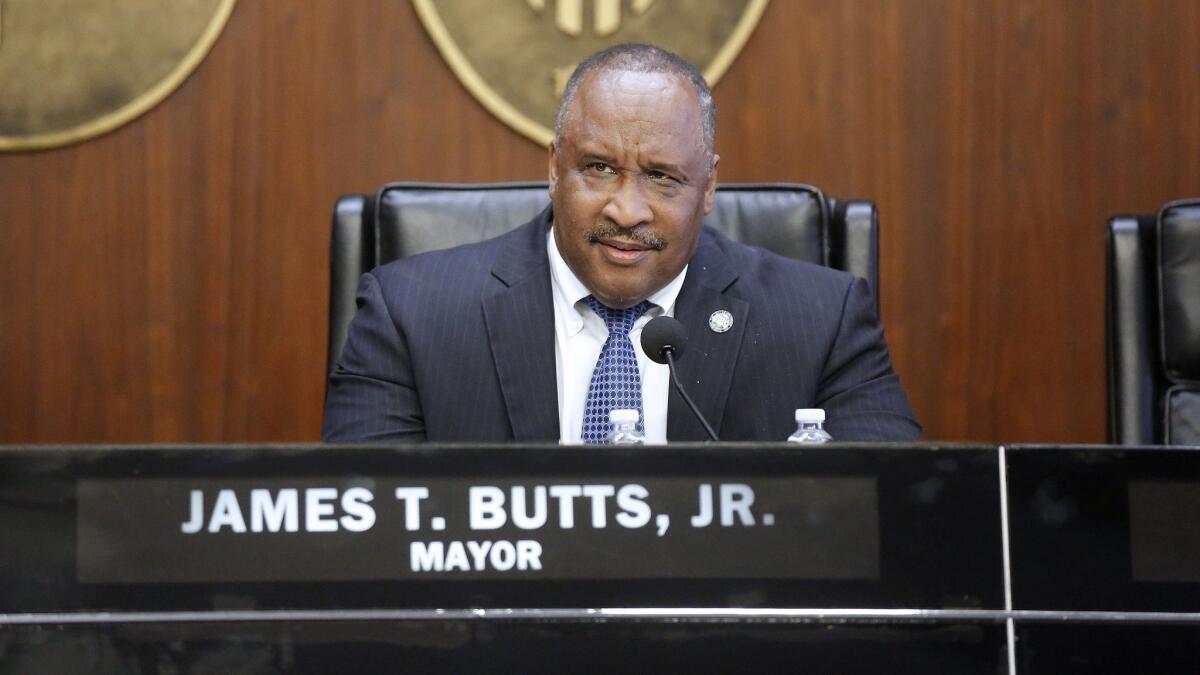
On Feb. 23, 2017, Wong emailed Ballmer and Zucker: “I got a call from Mr. Mayor 5 minutes ago. He just received a call [from someone connected to MSG] if it was true that the clippers are going into Inglewood.
“… Mr. Mayor was relieved when I told him that we had nothing to do with the rumor,” Wong continued. “This is a super sensitive period since MSG is reviewing the land release docs so let’s hope this fabrication does not slow MSG down.”
Ballmer sent a one-word reply: “Whew.”
Anxiety over MSG learning about the plan is a recurring theme in the documents. As early as April 28, 2016, Wong sent an email to Ballmer and others warning about Irving Azoff, a businessman associated with MSG and the Forum renovation.
“If there is nothing in it for him,” Wong wrote, referring to the Clippers eyeing the city-owned land, “he can and would make life miserable for us.”
Almost a year later, on April 3, 2017, MSG representatives terminated their lease with Inglewood. In subsequent court filings, the company’s attorneys alleged Butts tricked them into giving up the property by saying the city wanted to develop a technology park. The mayor denies it.
The day after the lease was terminated, Azoff emailed Butts and others about the mayor’s efforts to broker a deal for MSG to use parking at the new stadium. “I trust the mayor to get us to the promised land,” he wrote.
Less than a week later, Wong and Meany exchanged emails about Butts’ request for a face-to-face meeting to discuss the project. A draft of the exclusive negotiating agreement, Wrong wrote, could arrive in the next few days.
Three days before the Inglewood City Council approved the agreement — which included a nonrefundable deposit of $1.5 million — on June 15, 2017, Clippers executives reviewed their communication plan with a public affairs firm.
“One other note from the Mayor, since a joint press conference isn’t going to happen,” McCallum wrote in an email to the group, “he would like to be acknowledged by the Clippers, in their press statement, of his efforts for the past year in pursuing Inglewood as the location for the team.”
Zucker responded: “He’s certainly earned the acknowledgment.”
Meany had one suggestion.
“Totally agree we need to give the Mayor kudos, but suggest against time references,” the developer wrote. “Never good to have people focused on how long deals have brewed in back rooms.”
Sign up for our daily sports newsletter »
Twitter: @nathanfenno
More to Read
Get our high school sports newsletter
Prep Rally is devoted to the SoCal high school sports experience, bringing you scores, stories and a behind-the-scenes look at what makes prep sports so popular.
You may occasionally receive promotional content from the Los Angeles Times.

